06_pronouns
Pronouns(1)代词
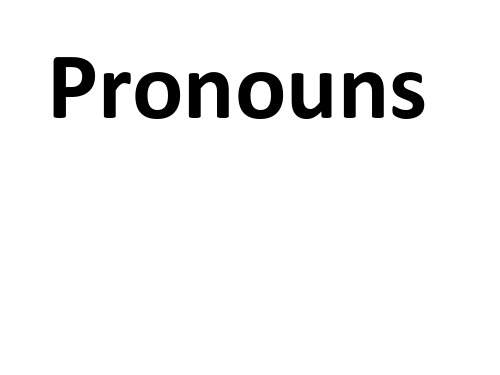
Possessive pronouns
Mine Yours His hers Possessive pronouns
Ours Yours theirs
3. Reflexive Pronouns
• Reflexive pronouns are words that refer to the noun or pronoun that is the subject of the verb. The words myself, yourself, himself, herself, itself, ourselves, yourselves and themselves are reflexive pronouns.
Lisa – proper noun (subject)
She has four cats.
She – pronoun (subject)
Sharma is a good teacher. He is a good player
• The objective of a verb : • me, you, him, her, it, us and them can all be
Examples :-
This book is mine. Have you lost yours, Tom ?
Singular personal pronoun
I , me You He ,him She, her Plural personal pronoun
We ,us You They , them
• Examples :-
• Everybody is welcome at the meeting. • Many prefer their coffee with sugar. • Does anybody care for a cheese sandwich? • Few choose to live in the arid desert.
语法教程--Pronouns,代词
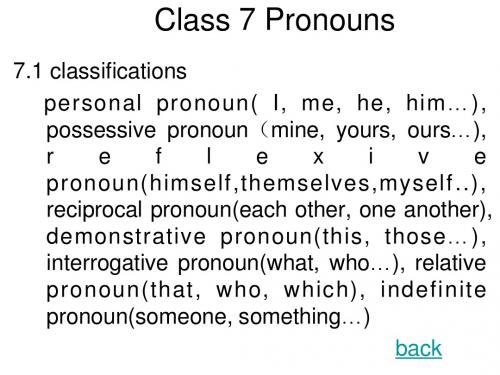
c. some common gender nouns such as “baby, infant, and child” may be referred to either by a personal or by a non-personal pronoun. If we do not know or interested in the sex, we can use “it”. If we are aware of the sex, we can use “he” or “she”. E.g.
★ Anybody can attend the meeting if he is interested. ★ Everybody talked at the top of his voice. ★ Everyone was clapping their hands.
b. As to “everything, something, anything and nothing”, the pronoun and corresponding determiner can only take the singular form. E.g. ★ Anything on the table can be thrown away, can’t it? 2. Pronoun concord with coordinate construction as antecedent. When the antecedent is a coordinate construction, the number forms of the pronoun and corresponding determiner are generally determined by the plural or singular meaning of the construction. E.g. ★ My friend and roommate has agreed to lend me his car.
Pronouns
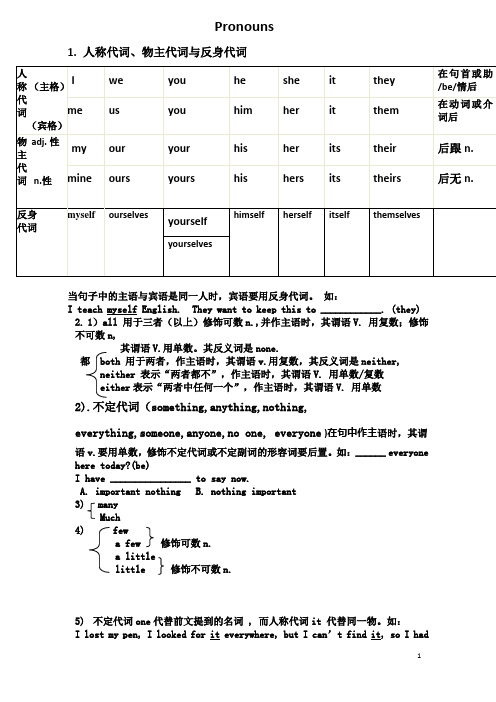
to buy a new one.6)other, the other, another, othersone...the other=2 one...another >2 another +数词 +名词复数some ... the others(other +n.) = allsome ... others(other+n.)くall①One of his two brothers is an engineer, _____ is a teacher.A. otherB. the otherC. others② Could you give me ______ three apples?A. anotherB. the otherC. others③In our class, thirty are boys, ________ are girls.B. other B. the otherC. the others④ English is spoken in Australia, England and ____ countries.A.otherB. the otherC. others7)some, any8)each, every9)so, suchso 修饰adj./adv,或代替一个句子,such修饰n. 但是当n.前有many,much,few,little修饰时,只能用so. 如:so much noise, such a good boy, such great progress①I’ve never seen _____ fool, he is ___ foolish.A. such a; soB. so; soC. so a ; such② Lucy was making ____ much noise this time yesterday. Do you think ___?A. such a; soB. so; soC. so ; such3. 指示代词this,that, these, those可用于打电话中的你----that, 我--- this, that还可以用于比较中的不可数n.如;----Who’s that speaking? ---- This is Lucy. Is that Tony?The weather in Wuhan is hotter than that in Kunming.4. 疑问代词(特殊疑问词/连接代词)what, who/whom, whose, whichWhat ----事物--- What are those? --- They are shoes.Who ----人---Who is that man? --- That’s my uncle.Whose ----谁的--- Whose watch is that? --- Maybe it’s Mary’s.Which ---- 哪一个5. 关系代词that, who, whichDo you know the man ____ is talking to your father now?A. whoB. whichC. whoseExx for Junior English Pronouns用所给词的正确形式填空。
英语Pronouns
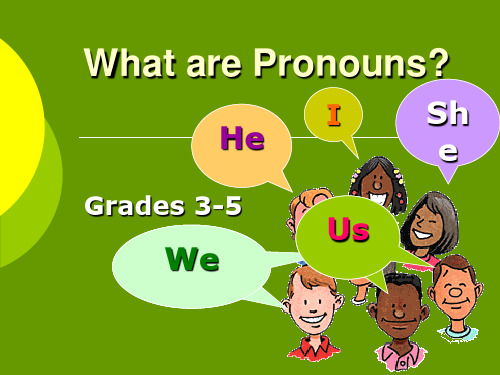
Missed it! Try Again
Think about what or who the pronoun represents.
Got it! Now try another.
Speed bumps help to slow down cars. They are found in many parking lots. bumps = They
Missed it! Try Again
Think about what or who the pronoun represents.
Got it! Now try another.
A hill is next to them. It is very steep. A hill= It
Choose the correct pronoun.
Choose the correct pronoun.
Marisa and Nora made their own costumes. wanted to save money. A. Them B. We C. They D. She
Missed it! Try Again
Think about what or who the pronoun represents.
Skateboards are fun, but they can be dangerous Skateboards = they
Choose the correct pronoun.
Speed bumps help to slow down cars. are found in many parking lots. A. It B. You C. Them D. They
Pronouns(1)(Answer)
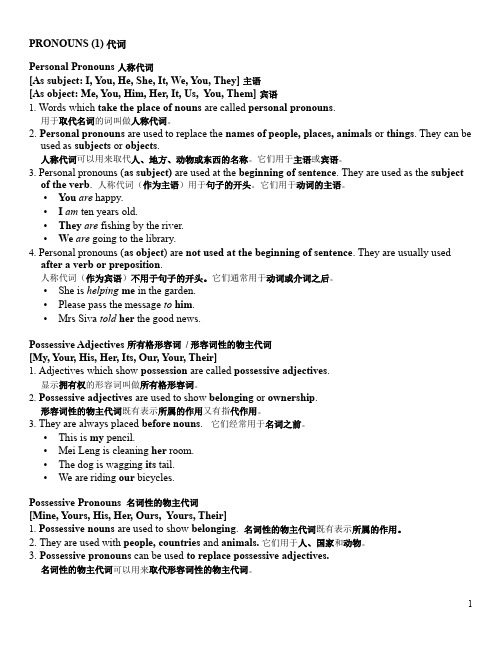
PRONOUNS (1) 代词Personal Pronouns 人称代词[As subject: I, You, He, She, It, We, You, They] 主语[As object: Me, You, Him, Her, It, Us, You, Them] 宾语1. Words which take the place of nouns are called personal pronouns.用于取代名词的词叫做人称代词。
2. Personal pronouns are used to replace the names of people, places, animals or things. They can beused as subjects or objects.人称代词可以用来取代人、地方、动物或东西的名称。
它们用于主语或宾语。
3. Personal pronouns (as subject) are used at the beginning of sentence. They are used as the subjectof the verb. 人称代词(作为主语)用于句子的开头。
它们用于动词的主语。
•You are happy.•I am ten years old.•They are fishing by the river.•We are going to the library.4. Personal pronouns (as object) are not used at the beginning of sentence. They are usually usedafter a verb or preposition.人称代词(作为宾语)不用于句子的开头。
它们通常用于动词或介词之后。
•She is helping me in the garden.•Please pass the message to him.•Mrs Siva told her the good news.Possessive Adjectives 所有格形容词 / 形容词性的物主代词[My, Your, His, Her, Its, Our, Your, Their]1. Adjectives which show possession are called possessive adjectives.显示拥有权的形容词叫做所有格形容词。
Pronouns
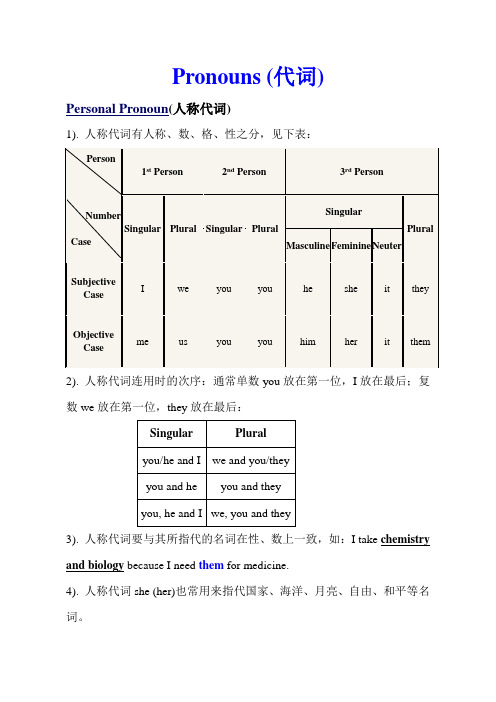
Pronouns (代词)Personal Pronoun(人称代词)1). 人称代词有人称、数、格、性之分,见下表:2). 人称代词连用时的次序:通常单数you放在第一位,I放在最后;复数we放在第一位,they放在最后:3). 人称代词要与其所指代的名词在性、数上一致,如:I take chemistry and biology because I need them for medicine.4). 人称代词she (her)也常用来指代国家、海洋、月亮、自由、和平等名词。
5).it可指事物、动物、未知的人;可表示天气、时间、距离等,也可作形式主语、形式宾语来代替不定式短语、动名词短语或从句,it还可用于构成强调句型,如:It's Sunday today.I found it necessary to go on with this experiment.It's Mary that we are talking about.Possessive Pronoun(物主代词)1). 英语中的物主代词有形容词型和名词型两种,见下表:2). 形容词型物主代词只能用作定语,而名词型物主代词可用作主语、宾语和表语,如:I can't find my pen. Can you lend me yours?3). 名词型物主代词可与of连用,构成双重所有格,如:She is a friend of mine.4).形容词型物主代词his, her, their等在人称、性、数上要和它们所指代的名词一致。
如果不能判断句中名词的属性,一般用his,如:Every girl is doing her best.Each teacher has his own teaching method.5). 集合名词作整体看待时用its(或his,her)指代,作个体看待时用their 取代,如:The Smiths could not agree on where to spend their vacation.The public expressed its concern about the flood.Reflexive Pronoun(反身代词)1).英语反身代词有:myself, yourself, himself, herself, itself, ourselves, yourselves, themselves。
Pronouns代词
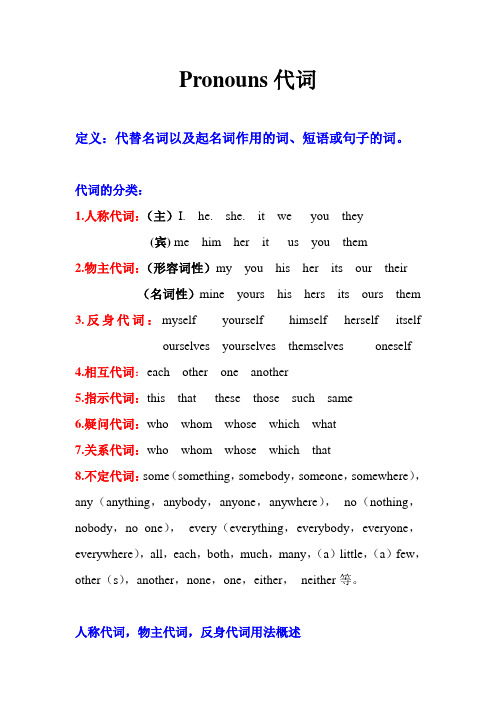
Pronouns代词定义:代替名词以及起名词作用的词、短语或句子的词。
代词的分类:1.人称代词:(主)I. he. she. it we you they(宾) me him her it us you them2.物主代词:(形容词性)my you his her its our their(名词性)mine yours his hers its ours them 3.反身代词:myself yourself himself herself itselfourselves yourselves themselves oneself4.相互代词:each other one another5.指示代词:this that these those such same6.疑问代词:who whom whose which what7.关系代词:who whom whose which that8.不定代词:some(something,somebody,someone,somewhere),any(anything,anybody,anyone,anywhere),no(nothing,nobody,no one),every(everything,everybody,everyone,everywhere),all,each,both,much,many,(a)little,(a)few,other(s),another,none,one,either,neither等。
人称代词,物主代词,反身代词用法概述这三种代词都有人称(一、二、三人称)的变化、数(单、复数)的变化,以及性(阴性、阳性、中性)的变化。
其中,人称代词除了这三种变化外,还有格(主格、宾格)的变化。
物主代词又包括两种形式:形容词性物主代词和名词性物主代词。
特别注意:形容词性物主代词its没有相应的名词性物主代词。
这三种代词的形式变化表如下:人称代词的用法注意1.几个人称代词并列作主语或作宾语时,排列顺序为“你-他-我”复数场合:we you 和theyEg: You she and I all enjoy music.We you and they are fond of music.单独使用的人称代词通常用宾格,即使它充当的是主语也是如此。
新编英语语法教程Pronouns
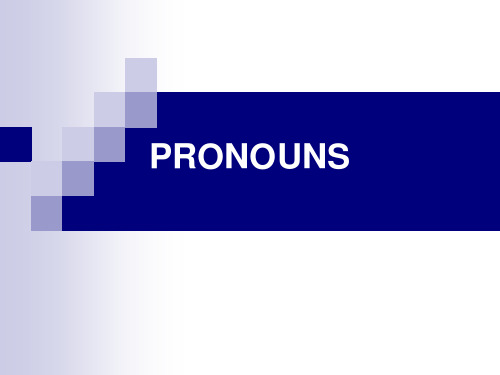
Interrogative pronouns:
what
who(ever), whom(ever), whose, which,
Relative pronouns:
that, as
who(ever), whom(ever), whose, which,
Indefinite pronouns:
some, something, somebody,
neither, either.
I have do much work this morning.
He has done much for his wife.
Concord
ANTECEDENT a word, phrase or sentence that is represented by
1. Just between you and (I, me) that man is crazy.
Reflexive pronouns:
Reciprocal pronouns:
each other(‘s), one another(‘s)
Demonstrative pronouns:
this, that, these, those, it, such, same
This book is yours, and that is mine.
Nouns of common gender
man They were pronounced man and wife at the
altar. We hold these truths to be self-evident, that all
men are created equal,… If a student needs advice about careers,
Pronouns(2)(answer)
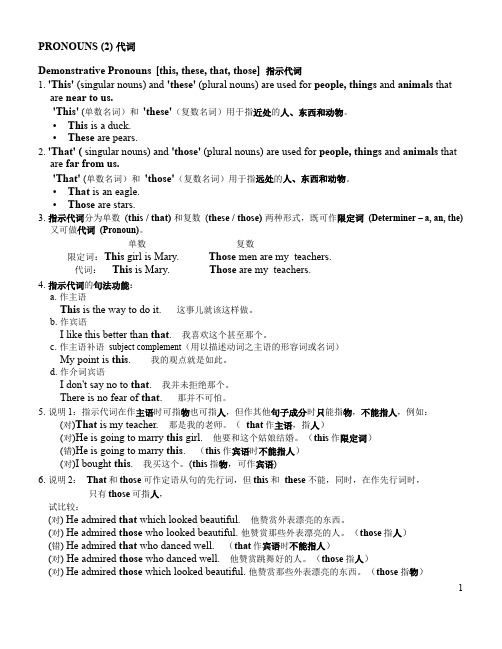
PRONOUNS (2) 代词Demonstrative Pronouns[this, these, that, those] 指示代词1. 'This' (singular nouns) and 'these' (plural nouns) are used for people, things and animals thatare near to us.'This'(单数名词)和 'these'(复数名词)用于指近处的人、东西和动物。
•This is a duck.•These are pears.2. 'That' ( singular nouns) and 'those' (plural nouns) are used for people, things and animals thatare far from us.'That'(单数名词)和 'those'(复数名词)用于指远处的人、东西和动物。
•That is an eagle.•Those are stars.3. 指示代词分为单数 (this / that) 和复数 (these / those) 两种形式,既可作限定词 (Determiner – a, an, the)又可做代词 (Pronoun)。
单数 复数限定词:This girl is Mary. Those men are my teachers.代词: This is Mary. Those are my teachers. 4. 指示代词的句法功能:a. 作主语 This is the way to do it. 这事儿就该这样做。
b. 作宾语 I like this better than that.我喜欢这个甚至那个。
c. 作主语补语 subject complement(用以描述动词之主语的形容词或名词) My point is this.我的观点就是如此。
新编英语语法教程Pronounsppt
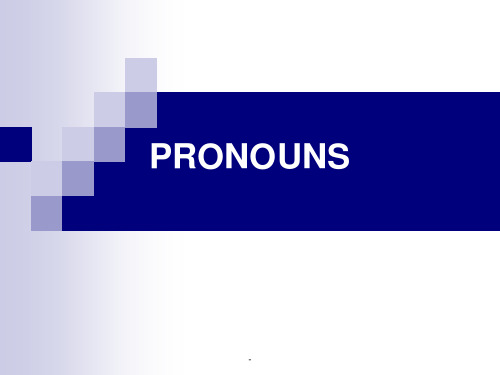
-
Classification
personal, possessive, reflexive, reciprocal, demonstrative, interrogative, relative, indefinite pronouns.
Personal pronouns:
I/ me, we/ us, you, he/ him, she/ her, it,
they/ them
-
Possessive pronouns:
my/ mine, our/ ours, you/ yours, his/
his, her/ hers, its/ its, their/ theirs
-
Concord in person
When it comes to making a conscious effort to help keep a public place clean, most people just don’t make the effort. I’m a maintenance man for a department store. If you did make the effort help keep the public place where I work clean, we probably wouldn’t have a job.
PRONOUNS
-
1. classification 2. concord 3. case forms 4. reflexive pronouns
PronounsPPT课件
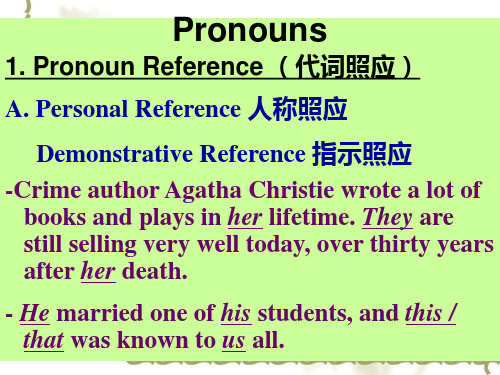
- Caswell pulled me to the hotel bar room and yelled for a waiter. We ordered drinks. While we drank, he talked continuously about himself, his family, his wife and her family.
Pronouns
1. Pronoun Reference (代词照应)
A. Personal Reference 人称照应
Demonstrative Reference 指示照应
-Crime author Agatha Christie wrote a lot of books and plays in her lifetime. They are still selling very well today, over thirty years after her death.
is when you (we) will enter elementary
school. In school, the child (we are) is no
longer “Mommy’s darling.” You (We) now
have to prove yourself (oursleves) to the
other children and also to your (our) teacher.
-
6
❖ If one (we seem) seems different from the other students, they (we) are treated differently, and these differences could be anything: pants, shoes, speech, religion, and so forth. It (They) really doesn’t matter. Yet right from the start, you (we) think that as long as you (we) are different, there is something wrong with you (us).
pronouns的词组搭配 -回复

pronouns的词组搭配-回复Pronouns are an essential component of the English language that help us refer to people, places, things, and ideas without repeating nouns constantly. These versatile words can be used as subjects, objects, possessives, or even reflexively. In this article, we will explore different word combinations with pronouns, understanding their functions, and providing examples along the way.1. Subject Pronouns:Subject pronouns replace nouns that function as the subject of a sentence. They include "I, you, he, she, it, we, they."Examples:- I am going to the store.- You are my best friend.- He plays soccer after school.- She is a talented singer.- It is a sunny day today.- We are going to the movies tonight.- They are studying for the exam.2. Object Pronouns:Object pronouns replace nouns that serve as the object of a sentence. They include "me, you, him, her, it, us, them."Examples:- John called me last night.- Can you lend me your pen?- I saw him at the party.- She helped her mother with the dishes.- The cat likes to play with it.- They invited us to their wedding.- Please give them the message.3. Possessive Pronouns:Possessive pronouns show ownership or possession. They include "mine, yours, his, hers, its, ours, theirs."Examples:- This book is mine, not yours.- The red bike is his, and the blue one is hers.- The dog wagged its tail.- Our house is bigger than theirs.- The responsibility of the project is ours.4. Reflexive Pronouns:Reflexive pronouns are used when the subject and the object of a sentence are the same person or thing. They include "myself, yourself, himself, herself, itself, ourselves, yourselves, themselves."Examples:- I cut myself while preparing dinner.- You should be proud of yourself.- He talks to himself when he's alone.- She hurt herself while playing basketball.- The computer turns itself off after a period of inactivity.- Let's enjoy ourselves at the party.- They organized the event by themselves.5. Demonstrative Pronouns:Demonstrative pronouns are used to point to specific people, places, or things. They include "this, that, these, those."Examples:- This is my favorite movie.- That is a beautiful sunset.- These are my new shoes.- Those flowers are blooming beautifully.6. Interrogative Pronouns:Interrogative pronouns are used to ask questions. They include "who, whom, whose, which, what."Examples:- Who is at the door?- Whom did you invite to the party?- Whose car is parked outside?- Which book do you want to read?- What time is the meeting?7. Indefinite Pronouns:Indefinite pronouns refer to non-specific people, places, or things. They include "all, another, any, anybody, anyone, anything, each, everybody, everyone, everything, many, none, nobody, nothing, some, somebody, someone, something."Examples:- All is fair in love and war.- Another opportunity will come your way.- Does anyone want coffee?- Each of the children received a gift.- Everybody enjoyed the concert.- Many were present at the event.- Nobody knows the answer.- Something made him smile.In conclusion, pronouns play an integral role in the English language by substituting nouns and making our conversations more efficient. Understanding their various forms and functions can help improve our writing and communication skills. So, let's continue practicing and expanding our knowledge of pronouns inorder to enhance our linguistic abilities.。
pronouns(代词的用法)
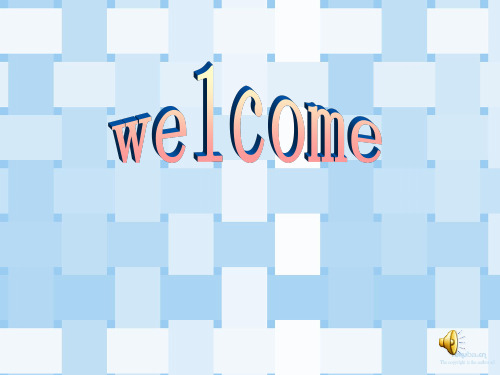
Work out the rules
Millie is the tallest girl in her class.(同义句转换) the other A: Millie is taller than ____ _____girls in her class. any _____girl other B: Millie is taller than ____ in her class.
---Don’t worry. _______ of the three roads can bring you there.
A. None B. Any C. One D. Both
解析:由回答中Don’t worry.可知,三条路中的任何一条都可 以带你去那儿。任何一个用any表示。
--How do you want your coffee, with sugar or cream?
(变式题)
-- I am really hungry, Mum. -- Oh,dear!There is _______left in the fridge. B Let’s go shopping.
---How many posters are there in the bag?
---______. We have put up all of them.
九年级英语中考复习
Pronouns(代词)
I them my yours
myself
something the others these who which
Personal pronouns(人称代词)
数 格 人称
单数 主格 宾格 主格
复数 宾格
第一人称 第二人称 第三人称
pronouns
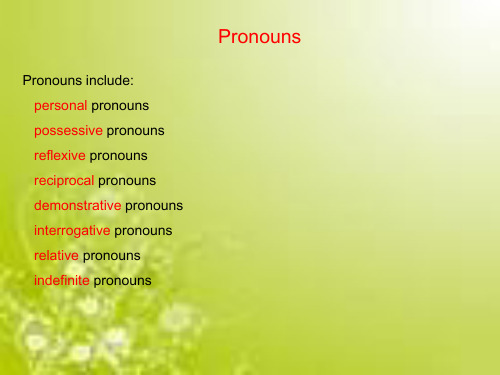
Attention should be paid to certain English names, such as Ally (f), Barney (m), Carmen (f), Doyle (m), Emile (f), Francis (m), Frances (f), Giles (m), Gill (f), Hallis (m), Holly (f), Ira (m), Ina (f), etc.. It’s difficult to decide whether they are male or female.
Pronoun concord in person
Person is a grammatical category. It is a grammatical form that show the referential meaning of pronouns. first person second person third person These three persons have their singular and plural forms and case distinctions: the subjective and the objective case. A pronoun must agree with its antecedent in person on the sentential level; secondly, in a broader context, that is, in texts or connected discourses, the speaker or writer must keep a consistent person in the use of pronouns.
英语语法之反身代词

presence are the same person or thing, and they match the
gender or nature of that person or thing
Ourselves
Definition
"Ourselves" is a reflective professor that refers back to the group that includes the speaker and at least one other person
01
Overview of reflective pronouns
Definition and characteristics
01
02
Definition: Reflexive proofs are proofs that end in "- self" or "helps" and are used when the subject and object of a verb are the same
Yourselves
Definition
"Yourselves" is a reflexive pronoun that refers back to the group being addressed
Example
"You should all take care of yourself."
Usage notes
Yourself
Definition
"Yourself" is a reflexive pronoun that refers back to the person being addressed It is used when the subject and the object of the presence are the same person
pronouns

ours yours theirs
ⅰ.Adjectival possessive pronouns serve as attribute in the sentence.
My computer has been updated.
ⅱ.Adjectival possessive pronouns are used with “own” to indicate emphasis.
Are these your books?
(subject)
I will keep this in mind.
(object)
These flowers are very beautiful. (attribute)
ⅱ.that, those denote the things that have been mentioned before; this, these denote the things what to say next.
2. possessive pronoun (物主代词)
3.reflexive pronoun (反身代词)
4.reciprocal pronoun (相互代词)
5. demonstrative pronoun(指示代词)
6. interrogative pronoun (疑问代词)
7. relative pronoun
attribute
person
who whom whose
thing
which which whose
person or thing that
that
whose
Relative pronouns are used to guide attributive clauses, and take the ingredients(成分) in a sentence.
Pronoun
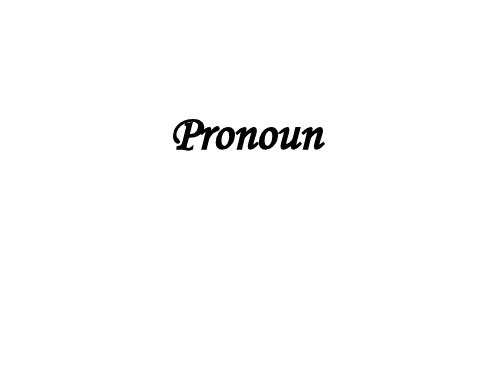
singular (grammatical concord) plural (informal style) (notional concord)
singular only
----R. Burton 人人都有优点和缺
• Everybody has his merits and faults.
点。—— 伯顿(英语言学家)
Pronoun
Definition
• A pronoun is a word which is used to replace a noun, a noun phrase, a clause or a sentence. e.g. Because he had a bad cold, Jack decided to stay in bed the whole day. The Browns said they might move to California.
1. Pronoun concord with every-, some-, anycompounds as antecedent
everybody everyone somebody someone nobody no one anybody anyone something everything Nothing
3) 抽象名词的性:人格化以后,凡表示力量、凶猛 等概念的名词(anger, death, fear, war…)为阳性;凡表 示优雅、美丽等概念的名词 (spring, peace, kindness, remembrance, truth, fame, chance…)为阴性。 The greatest friend of truth is time, her great enemy is prejudice, and her constant companion is humility.
七年级英语名词代词
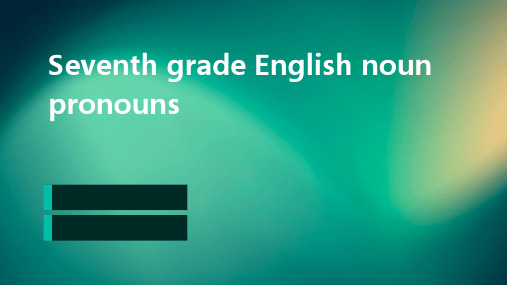
Notes on Demonstrative Pronuns
04
Relative pronoun
VS
Relative pronouns are words that connect a noun with a modifying clause, serving as a bridge between the two They introduce information that is essential for the understanding of the presence
Positive pronoun Conjunctive pronoun Indefinite pronoun Mutual pronoun
01
Personal pronouns
I
Used to refer to the speaker
We
Used to refer to the speaker and the listener (s) or other people
It
Used to refer to more than one person or thing, which is male, female, or neutral
They
Third person pronouns
02
Reflexive pronouns
reflexive pronouns
Possessive proposals are words used to show ownership or position
Summary
Positive pronouns are used in English to indicate ownership or position of a person, place, or thing They are typically used instead of a positive objective and the noun it modifications
英语语法是件让我头疼的事的英语作文

英语语法是件让我头疼的事的英语作文全文共5篇示例,供读者参考篇1English Grammar is Such a Headache!Ugh, English grammar is the worst! It's like this huge, complicated maze that I just can't figure out no matter how hard I try. Every time I think I've got a rule down, there's some exception that messes everything up again. It's so frustrating!Take plurals for example. You'd think making a word plural would be pretty simple, right? Just add an "s" and you're done. But nooooo, that would be too easy. Instead, we've got all these different rules for different word endings. Words ending in "ch", "sh", "s", "x", or "z" get an "es". Then there are the total oddballs like "child" becoming "children" and "mouse" becoming "mice". What's up with that?!And don't even get me started on verb tenses! I can never keep straight whether I should use the simple past or the past progressive or one of the twelve million other past tense forms. Why can't we just have one past tense and be done with it? "Iwent", "I was going", "I had gone"...my head is spinning just thinking about it!Subject-verb agreement is another grammar concept that ties my brain in knots. Sometimes the verb has an "s" at the end, sometimes it doesn't. It seems totally random! "He goes", "They go"...huh?? And forget about using the right verb form with words like "everyone" or "someone". My teacher tries to explain it using phrases like "singular subjects" but I have no clue what that even means.Then there are all the pronoun cases to worry about. Subject, object, possessive...ahhhh! I can never remember which one to use when. "He and I went to the park" or "He and me went to the park"? It's enough to make my head explode. And trying to figure out if I should say "my friend's house" or "my friend's house's yard"? Yeah, right!Don't even get me started on the ridiculous rules about double negatives, splitting infinitives, dangling participles, and all the other crazy grammar concepts my teacher drones on about. Who comes up with this stuff?! There are so many bizarre exceptions and contradictory guidelines, it's impossible to keep them all straight. "I didn't do nothing" is wrong but "I didn't see nobody" is okay? Yeah, that totally makes sense.The worst part is, even when I think I've studied and practiced the grammar rules to death, I still make dumb mistakes on tests and get points deducted. My teacher just doesn't understand how insanely confusing and mind-boggling English grammar is. No matter how many rules and examples I memorize, there's always some new curveball to trip me up.I don't know who decided English needed to have all these complex grammar conventions, but they must have been some kind of sadistic genius bent on tormenting school kids for generations to come. Couldn't they have made things nice and straightforward instead? Maybe then I'd actually be able to enjoy reading and writing instead of breaking out in a cold sweat every time I have an English assignment.I guess I'll just have to resign myself to the fact that English grammar will always be my academic kryptonite. No matter how many grammar books I read or how many hours I spend reviewing the rules, there will always be some grammar concept waiting to make my brain hurt. Stupid English and its stupid, convoluted grammar! Who needs it anyway? Maybe I'll just become a monk and take a vow of silence...篇2English Grammar is a Big Pain!Hi there! My name is Jamie and I'm in the 5th grade. I have to tell you, learning English grammar is just the WORST. It makes my head hurt so much!The thing that confuses me the most is all the rules. There are rules for nouns, verbs, adjectives, adverbs, and all these other crazy grammar words I can never remember. Like why do we need so many rules? Isn't English hard enough already?Let me give you some examples of rules that make no sense to me. Okay, so there are plural nouns and singular nouns. Plural means more than one, like "dogs" or "houses." Singular is just one, like "dog" or "house." Seems easy enough, right? WRONG!That's because there are all these weird exceptions and irregular plurals that make no sense. Like why is the plural of "child" not "childs?" It's "children!" That makes no sense to me. And what about "mice" for the plural of "mouse?" Uhh, I thought the plural was supposed to end in "s" but apparently not always. My brain hurts.Oh, and don't even get me started on verb tenses. There's past tense, present tense, future tense, conditional tense, and so many more. Why can't we just say what we did, what we're doing,and what we're gonna do? All these specific tenses like "I will have been walking" or "I would have walked" just boggle my mind.And you know what's really tricky? Irregular verbs! Why oh why can't all verbs just follow a pattern? But no, we've got verbs like "go" where the past tense is "went" which makes no sense to me. And don't forget "run" becomes "ran" and "eat" becomes "ate." It's madness I tell you!Subject-verb agreement is another grammar rule that ties my brain in knots. Basically, the subject and verb have to agree in number. So if the subject is singular like "the boy" then the verb is singular "runs." But if the subject is plural like "the boys" then the verb is plural "run." Seems logical enough.But here's where it gets crazy. With subjects like "everyone" it's technically singular so you say "everyone IS going" not "everyone ARE going." But it feels so wrong to my ears! I always want to say "everyone ARE going" because it just sounds better. Grammar is silly sometimes.I could go on and on about confusing grammar topics like distinguishing between adjectives and adverbs, using "good" vs "well" properly, avoiding run-on sentences and fragment sentences. It makes me want to pull my hair out!What really gets me though, is when my teacher tries to explain these grammar concepts using all this technical jargon. They'll be like "Okay class, pay attention. This is a gerund phrase modifying a subordinate clause!" And I'm just sitting there like:"Huh? A ger-what phrase? Sub-or-what clause? I'm never gonna need this stuff in real life! Why am I even learning it?"My brain can only handle so much grammar at this age. I understand that learning the rules of English is important. But why does it have to be so confusing and complicated all the time?Sometimes I just want to speak and write how I naturally would, without having to worry about obsessing over every little grammar rule. As long as people can understand what I'm saying, isn't that good enough?My parents are always nagging me about how important grammar is though. They'll say "Jamie, you'll never get into a good college if you don't master English grammar!"Yeah, yeah, whatever. I still have a few more years before I need to stress about colleges. For now, can't I just be a kid? Grammar is for boring adults, not fun elementary schoolers!I guess at the end of the day, I'm going to have to accept that grammar is just a unavoidable part of learning English. As much as it pains me, I'll keep on studying those rules and doing my grammar worksheets. Maybe it'll start to click at some point!But for now, pardon me while I go take some aspirin for this pounding headacheI've gotten from writing this essay on grammar. The struggle is real, folks! That's all I've got to say about that. Thanks for listening to me rant and rave! A grammar break sounds nice...篇3English Grammar Makes My Head Hurt!Oh boy, where do I even start when it comes to English grammar? It's like this huge, confusing maze that I can never find my way out of. Just thinking about all the rules and exceptions gives me a pounding headache!Let's start with something super basic that they taught us way back in first grade - plural nouns. Okay, so if I have one apple, I just say "apple." Easy peasy. But if I have more than one, I have to put an "s" at the end, so it's "apples." Kind of makes sense, right? But then they threw us a curveball with words like "child." One child, two...children? What's up with that? Myteacher said it was an "irregular plural" but I just call it annoying and unfair.And don't even get me started on verb tenses. We've got simple past like "I walked," but then there's also past progressive like "I was walking." How is a kid supposed to keep track of when to use which one? Oh, but it gets better - there are like a million other tenses too, like past perfect, future perfect, and I'm pretty sure they just made some of those up to confuse us.Speaking of confusing things, how about pronouns? Basically, they're just words that take the place of nouns, like "he," "she," "it"...but good luck figuring out which one to use when. You'd think "it" would be for things, but then why do we call boats and countries "she?" I'm constantly mixing up "who" and "whom" too. Who can keep track?!Then we get into advanced topics in the higher grades, like the passive voice. Somehow, "The ball was thrown by John" means the same thing as the much simpler "John threw the ball." If that's not needlessly confusing, I don't know what is. Don't they want us to speak and write clearly?And let's not forget about all the exceptions to every rule they try to teach us. I before E except after C, okay got it...exceptfor in words like "weird" and "seizure" and a million other cases. It's enough to drive a kid crazy!Sometimes I just want to raise my hand and ask, "Who decided all these crazy grammar rules anyway?" Was it some secret society of grumpy old teachers who got together just to make life miserable for kids like me? Because that's certainly what it feels like.I guess I'll eventually get a better grasp on English grammar if I keep studying and practicing. But for now, it's giving me a giant headache trying to memorize all the nitpicky rules and bizarre exceptions. Is it too much to ask for a simple, straightforward language without all the inconsistencies?My brain definitely prefers math, where 2 + 2 always equals 4. Not like in English, where two "mice" are the plural of "mouse" because...reasons, I guess? It's just one continuous blur of headache-inducing weirdness.Don't get me wrong, I actually do enjoy reading, writing, and even public speaking sometimes. But having to constantly worry about using proper grammar sucks a lot of the fun out of it for me. I'll form a sentence in my head, really loving how it sounds, but then I second-guess myself - "Wait, is that subject-verb agreement correct? Is 'good' or 'well' the right word there?"You know what Mathematics and Art classes have in common? No grammar rules! You don't have to say "one plus one were two" or "that circle model looked good." Just think about how liberating that must feel!I know English grammar is important for communicating clearly. But at least let me get through elementary school before cramming all these obscure rules and exceptions down my throat, please? A little kid's brain can only take so much!I'll keep plugging away, learning grammar concepts one headache at a time. Who knows, maybe some day in the distant future the rules will click and finally make sense. Or maybe, just maybe, some smart grown-ups will finally wake up and simplify English grammar for the sake of kids everywhere.Either way, English teachers better be stocked up on bottles of child-strength headache medicine. Because we're going to need it while muddling through this crazy grammar maze! I'll just be over here with some construction paper and safety scissors, happily avoiding participles and run-on sentences for now. Grammar today, headache tomorrow!篇4English Grammar Makes My Head Hurt!You know what really bugs me? English grammar! It's just so confusing and makes my head spin like a tornado. Why can't it be simple like math or science? At least with those subjects, there are clear rules that always work. But English grammar feels like a big jumbled mess with about a million exceptions to every rule. No matter how hard I try to understand it, it always finds a way to trip me up and tie my brain in knots. Let me give you some examples of what I'm talking about.Verb TensesThese are honestly the bane of my existence when it comes to English. There are just way too many of them - present, past, future, present perfect, past perfect, future perfect...my head is already throbbing just listing them out. And for each tense, you have to remember different word endings like -ed, -ing,has/have, will, etc. It's an absolute nightmare! I find myself oversleeping because I stayed up way too late struggling through my verb tense homework. Why can't we just say everything in the present tense and be done with it?Irregular VerbsOkay, if regular verb tenses weren't bad enough, there are a gazillion irregular verbs that just ignore all the normal rules. The past tense of "go" is "went"...why not just "goed"? That wouldmake sense! And how about "run" becoming "ran" or "eat" becoming "ate"? Who decided these crazy exceptions? I get mixed up whenever I try using irregular verbs and always use the wrong one. "I ated the cookie" or "I run to the park yesterday." See, it's maddening!Subject-Verb AgreementThis one really makes me want to bang my head against the wall. You have to make the verb agree with the subject in number (singular or plural). Sounds easy enough, right? But then you get trick subjects like "The group of boys is..." - Wait, wouldn't it be "are" since it's multiple boys? And let's not even get started on indefinite pronouns like "everyone" or "somebody." Ugh, my brain hurts just thinking about it!ApostrophesThese little punctuation gremlins are the worst! You use them for possessive nouns and contractions, but figuring out where to put them can feel impossible. I constantly mix up "it's" and "its", "your" and "you're", "their" and "they're." By the time I get the apostrophes right, I've got a pounding migraine. Why do they have to exist?!HomophonesWords that sound the same but have different meanings and spellings...who thought this was a good idea? I can never keep straight whether I need "they're", "their" or "there." Same with "two", "too" and "to." It's just cruel and unusual punishment if you ask me. My essays always end up with the wrong homophones because they befuddle my brain so much.I could go on and on with more examples of grammar rules that make me want to pull my hair out in fistfuls. The point is, English grammar is honestly too hard and convoluted for a kid like me to fully understand. I do my best, but it always finds a way to outsmart me and make me feel like a dummy. I dream of a language where you just string words together freely without all the crazy grammar constraints. Now that's something my overstressed brain could get behind! Until then, I'll be the kid rocking back and forth in the corner, mumbling about irregular plural nouns and trying not to let English grammar drive me insane. Wish me luck!篇5English Grammar: My Biggest HeadacheOh man, English grammar is sooo difficult and confusing! It's like a huge, tangled knot in my brain that I can never seem tounravel. Just when I think I've got a rule figured out, there's always some exception or irregular case that trips me up. Why can't English just be simple and straightforward like math? At least with numbers, everything follows clear rules without any weird inconsistencies.My biggest struggle is probably with verb tenses – keeping track of when to use past, present, future, present perfect, and all those other tenses is enough to make my head spin. I mix them up all the time, even though my teacher has gone over the rules like a million times. And don't even get me started on irregular verbs...how am I supposed to remember that the past tense of "go" is "went" but the past tense of "see" is "saw"? It's all so random!Then there are the endless lists of rules we have to memorize, each with a bunch of little exceptions tucked in. Subject-verb agreement, article usage, count vs non-count nouns, relative clauses, conditional sentences…my brain feels like it's going to explode just thinking about it all. Why can't the rules just be straightforward without any of those pesky exceptions and special cases?And let's not forget about homophones – words that sound exactly the same but have different meanings and spellings, like"there", "their", and "they're". I always get those mixed up when I'm writing because they all sound identical in my head. Same with "to", "two", and "too". It's enough to drive anyone crazy! My teacher is constantly circling those errors on my papers in angry red ink.Speaking of writing, have you ever noticed how many wacky punctuation and capitalization rules there are in English? I can never remember if I'm supposed to put a comma before the "and" in a list, or whether the first word of a quotation gets capitalized if it's not a new sentence. Don't even ask me about using semicolons because I'm totally clueless on that one. There are just too many fiddly little details to keep straight!Unfortunately, even when I think I have a good handle on English grammar rules, new stuff keeps getting introduced that makes it all complicated again. This year we started learning about passive voice, subjunctive mood, and something called the nominative absolute. What Just when I was finally feeling okay about the basics, they threw all these new advanced concepts at us. I'm never going to be able to keep it all straight!The worst part is, teachers and parents are always stressing how important it is to have good grammar. They'll say stuff like "You need to know this for standardized tests!" or "Grammar isthe foundation for all writing skills." But from where I'm standing, English grammar seems specifically designed to make my life miserable. Like it's some kind of sick joke played on elementary school kids everywhere.My friends and I have begged our teacher to just let us text and use slang and abbreviations for everything because TBQH that's way easier than trying to remember Oxford commas and dangling modifiers and whatever. But she always says "Absolutely not, young lady/man! You need to learn formal English grammar to be taken seriously in the real world." Ugh, why does the adult world have to be so strict and fancy with their grammar?Don't get me wrong, I actually enjoy learning in general and I do okay with most other subjects. But English grammar honestly stresses me out and gives me so much anxiety. I lie awake at night, tossing and turning as I wonder things like "Was that's an apostrophe mistake on my essay?" or "Should I have used'whom' instead of 'who' in that sentence?" It's exhausting!I've tried so many strategies to try and get a grip on grammar – making flashcards, singing grammar rules to silly songs, watching YouTubevideos, you name it. But nothing ever sticks for very long because there are just too many nitpickydetails to remember. Instead of helping me understand, it all just turns into a jumbled mess in my head.I know I'm supposed to appreciate how grammar improves communication and makes the meaning of our writing clearer. And sure, I can kinda see how having some consistent rules does make things more structured and avoids total chaos. But at this age, worrying about the finer points of grammar seems to suck all the joy out of reading, writing, and self-expression.From where I'm standing, English grammar is just one big annoying chore that gets in the way of actually using the language. To me, putting words together to share ideas and tell stories is supposed to be creative and fun...not bogged down by a thousand language "laws" with tons of exceptions to police our every sentence. Maybe it'll click for me eventually as I get older, but for now, English grammar remains my biggest academic headache and source of endless frustration. I just have to power through and keep practicing, I guess. But I won't be sad to see the back of grammar drills and worksheets once I finally make it to middle school!。
- 1、下载文档前请自行甄别文档内容的完整性,平台不提供额外的编辑、内容补充、找答案等附加服务。
- 2、"仅部分预览"的文档,不可在线预览部分如存在完整性等问题,可反馈申请退款(可完整预览的文档不适用该条件!)。
- 3、如文档侵犯您的权益,请联系客服反馈,我们会尽快为您处理(人工客服工作时间:9:00-18:30)。
无生命:it / its / itself 带感情色彩: 船员:ship she; 车主:car she (he); cat herself; the sun his; China she e.g. Once upon a time, there was a wolf in sheep’s himsel clothing, hiding _________ among a flock of sheep. e.g. The moon glitteredf as ____ rolled through the sh e deep vault of a cloudless sky. he or e.g. If a student needs advice about careers, ______ she should consult career officers. it e.g. When bathing a baby, always hold ____ securely.
原则上:单数;非正式:复数
e.g. Everybody talked at the top of his voice.
e.g. Everyone was clapping their hands.
四个thing一般用单数 everything, anything, nothing, something
A. B. C. D.
Warming-up Exercise - 5
Last year, I paid a three-day visit to the company as a visiting engineer, and was treated ____. such as such like it such as
6.1 Pronoun1.The cast is giving (its, their) best performance.
2. Somebody left (his, their) raincoat on this rack; (he, they) will have to come and get it. 3. The committee will insist on (its, their) rights. 4. Everyone thinks (he is, they are) the center of
6.4.1 subjective or objective?
主语用主格,但是有特例 Does any of you know where Tom live? Me.
1) 不完整句中,即便是主语,习惯上也用宾格
-
2) 非正式语体的比较句中,主语可以用宾格,特别是有all, both做同位语
e.g. He isn’t as smart as he (is). e.g. I trust you as much as her. e.g. He is cleverer than us all.
e.g. Anything on the table can be thrown away, can’t it?
6.1.2 先行项为并列结构时,根据意义选择
e.g. My friend and roommate …. his… e.g. My friend and my roommate …. their…
A.
B.
C. D.
Some people sacrifice their dignity for money.
Few people can resist the temptation of money. Disputes over money may ruin a relationship.
6.0 Classifications
its their 不定
反身代词 单数 复数
三
himself, herself, oneself itself
themselves -
6.4 Case of pronouns
主格 subjective case
宾格 objective case
属格 genitive case 名词性属格代词 hers (nominal genitive pronoun) 限定词性属格代词 her (determinative genitive pron.)
6.1.3 先行项为某些集体名词时,根据名词的意义决定
e.g. The team has won its first game.
e.g. The team are now on the floor talking their practice shots at the basket.
6.1.4 先行项为“复数名词/代词+each”
Warming-up Exercise - 2
The information is confidential. We should keep it among ____. us our ourselves ours
A. B. C. D.
Warming-up Exercise - 3
He told me part of the story and that was ____. it this so that
A. B. C. D.
Warming-up Exercise - 6
- Have you ever met Tom’s sisters?
- I have met one. But I did not know he had ____.
other the other ones another
A. B. C. D.
Warming-up Exercise - 7
He was informed that it was ____ who wanted the interview. I mine me my
A. B. C. D.
Warming-up Exercise - 8
“Everyone can not answer the question.” The meaning of the sentence is ____. All can answer the question. None of them can answer the question. Some of them can answer the question, others can’t. Neither of them can answer the question.
3. I recognized one of the girls, but I didn’t speak
to (
her
).
6.1.1 先行项为every-, some-等复合代词
everyone, everybody, no one, no body, anyone, anybody, someone, somebody
A. B. C. D.
Warming-up Exercise - 4
He is ____ here in town, but I suppose he is ____ in his village. no one, some one any one, no one anybody, nobody nobody, somebody
A. B. C.
D.
Warming-up Exercise - 9
“Money is known to be one of the things most like to bring a relationship to its knees.” What is the meaning of the sentence? Money is considered to be the root of all evils.
the universe.
代词的单复数的形式的选择通常取决于它们的指代 对象,即先行项的单复数形式。
1. The women in the committee expressed ( thei ) r opinions forcefully. 2. One must remember to remain very still when ( one/he ) attends a concert.
Common gender
An instructor should offer his students challenging projects. Instructors should offer their students challenging projects. An instructor should offer challenging projects to the students. An instructor should offer his or her students challenging projects. he or she, his or her 这样的词组除在法律文书外,不 宜多次出现,为保证简练,选用复数避免使用代词。 baby, infant, child等不知性别或不必过问性别,用it
6.3 Pronoun concord in person
句中 (sentence) 人称一致,语篇 (text) 中人称一致 Jane and I we; you and Lucy you; the girl she
人 称 代 词 主格 宾格 属格 单数 三 一 二 不定 一 二 三 复数
阳性 阴性 中性
